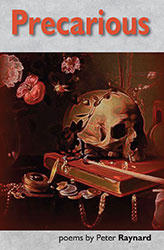Precarious - OUT OF PRINT

Peter Raynard’s debut collection Precarious takes questions of masculinity, class, mental health and work head on, issues that many people, especially men and boys, find difficult to address. Rosa Luxembourg, Orgreave, 11-plus failures, tic-tac men, a priest from central casting and a man who only eats sandwiches – it’s a book about precarious times, hard lessons and fragile lives, a defiant celebration of British working-class life and the people ‘who make the wheels go round’, provocative, funny, poignant and bloody angry.
Cover image: Adriaen van Utrecht, Vanitas Still Life with Flowers and Skull (1642)
Sample Poems
Scholarship boys
Unlucky enough to pass our eleven plus we were claw-crane selections from our class dropped into a history the likes of us had never read. Inducted with pictured corridors of Spiritus Vicis spouting opportunity from the mothballed grammar of the cloak-wielding Headmaster and his fountain of Latin characters. Amo, amas, a matter of opinion was to know our place. Our mouths were swabbed for memories. We were to become someone else’s nostalgia. By the time we left early, five of a seven-year stretch, we stooped off to the factories that laughed at us for taking the long way round.
How to write the working classes
(e-mail from the paper’s editor) For your purposes, the collective noun for the working class is ‘These People’ or ‘Those People’ never ‘The People’ or ‘My People’. Ideally you are looking for an inbred, saggy clothed, Sports Direct, Union Jack pale-faced male who claims he can trace his ancestors back to Neanderthal times. They’ll have a tight-leashed musclebound dog, with rabid flecked jaw, ravenous for an outsider’s hairy calf. The female of the species, will be a barely been to school, heavily made up heavily pregnant, ciggie hanging from botoxed-lipped slag with a neck tattoo of an ex-boyfriend, pushing a brown skinned baby wailing its lungs out. Bonus if she’s got slightly older multi-coloured offspring biting at her heels. For interviews, go to a rainy Saturday market where salt-of-theearth traders shout ‘cum an’ ‘av a look, pand a bowl’& other such unintelligible tongue-juggling noises, to try and get you to buy their rotting fruit and veg. Swear about the weather, then ask ‘how’s business gavna?’ before moving on to ‘do you think there are too many immigrants living in your back garden?’ or ‘how would you feel if your daughter came aboard with a Caribbean rapper?’ When describing their estate, use words like concrete, boarded up, brutal, dank, bleak, unloved – pepper your sentences like a rancid Berni Inn steak. Get them to heap blame on the metropolitan elites, who they feel rule over them like hand-me-down warlords from Henry the VIII; politicians will be the main target, but they’ll also harp on about big business, the council, estate agents, & middle-class teachers who make their kids learn German or Jihadi. Talk of Brexit will give vent to their alleyway of opinions on independence, from ‘now we can take our country back’ to ‘now we can send them all back’. (Btw, only ever mention the Royal Family, when getting them nostalgic). Pretend to take copious notes to induce a feeling they’re finally being listened to. Don’t waste time on their cultural interests, you’ll only get them gabbing on about their second hand cousin removed who got to the regional semi-finals of Britain’s Got Talent with their rendition of God Save the Queen whistled entirely through their le nostril (the other one will have a ring through it). If they start talking about pigeons or their collection of dominoes trophies, close them down, as you’ll end up in some mouldy old shed, offered a roll up and a mug of quarried tea. When you leave, slip them a score (that’s a twenty) tell them it’s been real, then rush off home to submit copy, neck a whisky, snort a line then shower yourself furiously, as if you’ve just been raped.
If we were real
‘The people who make the wheels go round have always been ignored by novelists. When they do find their way between the corners of a book, it is nearly always as objects of pity or as comic relief.’ George Orwell Jo’s mum Helen is a slag, doesn’t stop her having a go at Jo getting pregnant by a black man and staying in a hole with that pansified little creep though. Colin’s mum is no better, she’s just after his dead dad’s insurance money, but Colin’s a little toe rag running for his life, who’ll let the whole fucking lot of them down. Arthur’s a proper hard bastard, working his seed into as many women as he can. And guess what, Victor’s only gone and got his missus up the ready rough, so has to live with the mother-in-law, and she’s had a leading role in working men’s jokes for years. Tommy’s off up the match, an away game kick-the-shit out of any proper casual who’ll have it. Ray beats up his missus when he gets home, stamps on her throat like some rat he found in the bog. Lol’s Dad commits the horrors with her sister and her mate any place he can, then tries it on with her until Combo ends the cunt. Young Timmy knows how to enjoy himself, he cleans double breasted windows, or checks under the sink for some scantily clad plumbing, before delivering a whipped cream double entendre to bored housewives. Rita likes a bit of that an’ all, off shagging Bob, with her mate Sue, but her namesake tries her hand at books instead of dotting her luck on the bingo of a Saturday night. Shirley’s fucked off to Greece, can’t stand talking to the wall no more, cooking egg ’n chips for her husband, who believes that’s a woman’s place. Billy’s dad knows what a man should be, and it’s not a fucking dancer. Rent’s smacked off his boat, so goes swimming for a pearl in the filth of the bog, whilst Dushane’s a boy at the top of his game, on the estates round his way. Like Frank’s kids, who surround him like a wreath, this all may be true. And Big Chris is right when he says, ‘It’s been emotional.’ But is that really all we are? Do we not go by any other names?
Four white lads on their way to Black Uhuru, 1980
And we are marching, rising up with borderless rhythm, genetically mixed beats, Far I growling, Upsetters cheering, Head Charge chanting, stepping from our skin, uniting the left and right side of our brains. Heeding a four/four beat, smooth as Night Nurse or the guy who sold us cheap weed with fire-cracking seeds that burn our nose. The money’s signed on for, the van siphoned to the max, we spark a spliff careful not to catch a fire with our petrol lips. Late as a dealer we drive to Shakespeare bass upon Dunbar snares along the M45 out of Coventry. Shooting past Babylon leaving a cloud of collie on the outside lane, they light up under blue sirens. We are burned. The coming decade is a road of hot coals and we can’t dance.
Marx versus God
I’ve seen all the poster boys of communism; Marx & Engels, Lenin & Trotsky, Guevara & Castro. Read each of them all, an all, an all, like torn out pages of porn found down the fields. Plastered them up in a book of scrap kept under the bed. Watched endless clippets of their icon-you-not speeches, unfurled egos from the throats of Mao to Chavez. Agreed with a lot of the wind, caught up in their sails flapping like a butterfly’s wing. Saw them cult-like, occupy the minds of disciples stood outside High Street brands flashing indoctrination with no gloss but full of emulsion to slip between the arse-cheek IQs of passers-by. I’m from those masses, full of coke and free of opium, watching Kentucky fried mind-fattening programmes where the runt of personality is wrapped up like bikini-clad mags written by middle class lads you buy on your way to the tills, along with breath fresh mints and full strength condoms. I’ve been in the pubs & clubs, shop floors & sites, school gates & libraries. Been on protests & marches, took part in witch hunts of rich cunts we never managed to kick the fuck out of. I’ve been with all of those comrades, holding kids & sickles, books & shovels, remotes and Molotovs. But I never could decide whether to stick with the pack or twist my arms back and let them hang, broken by my side, as God intended.



